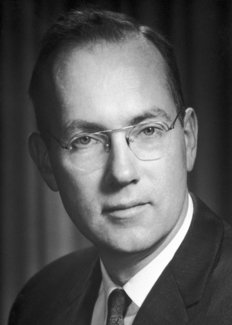Charles H. Townes
 | Charles H. Townes was awarded the Nobel Prize in Physics in 1964 along with Nicolay G. Basov and Aleksandr M. Prokhorov. Charles Hard Townes was born in Greenville, South Carolina, on July 28, 1915, the son of Henry Keith Townes, an attorney, and Ellen (Hard) Townes. He attended Furman University in Greenville, where he completed the requirements for the Bachelor of Science degree in Physics and the Bachelor of Arts degree in Modern Languages, graduating summa cum laude in 1935, at the age of 19. |
At Columbia University, where he was appointed to the faculty in 1948, he continued research in microwave physics, particularly studying the interactions between microwaves and molecules, and using microwave spectra for the study of the structure of molecules, atoms, and nuclei. In 1951, Dr. Townes conceived the idea of the maser, and a few months later he and his associates began working on a device using ammonia gas as the active medium. In early 1954, the first amplification and generation of electromagnetic waves by stimulated emission were obtained. Dr. Townes and his students coined the word “maser” for this device, which is an acronym for microwave amplification by stimulated emission of radiation. In 1958, Dr. Townes and his brother-in-law, Dr. A.L. Schawlow, for some time a professor at Stanford University but now deceased, showed theoretically that masers could be made to operate in the optical and infrared region and proposed how this could be accomplished in particular systems. This work resulted in their joint paper on optical and infrared masers, or lasers (light amplification by stimulated emission of radiation). Other research has been in the fields of nonlinear optics, radio astronomy, and infrared astronomy. He and his assistants detected the first complex molecules in interstellar space and first measured the mass of the black hole in the center of our galaxy.
The Nobel Prize in physics, 1964, was awarded "for fundamental work in the field of quantum electronics, which has led to the construction of oscillators and amplifiers based on the maser-laser principle." In addition to the Nobel Prize, Townes has received the Templeton Prize, for contributions to the understanding of religion, and a number of other prizes as well as 27 honorary degrees from various universities.
When Townes received the Nobel Prize in 1964, I was using the book "Microwave Spectroscopy" authored by he and his brother-in-law Arthur Schawlow and was intensely involved in my Ph.D. work at Georgia Tech in Microwave Spectroscopy. I received my Ph.D.in 1966.
"Explore As Much As We Can"
"Intelligent design, as one sees it from a scientific point of view, seems to be quite real. This is a very special universe: it's remarkable that it came out just this way. If the laws of physics weren't just the way they are, we wouldn't be here at all. The sun couldn't be there, the laws of gravity and nuclear laws and magnetic theory, quantum mechanics, and so on have to be just the way they are for us to be here. Some scientists argue that 'well, there's an enormous number of universes and each one is a little different. This one just happened to turn out right.' Well, that's a postulate, and it's a pretty fantastic postulate - it assumes there really are an enormous number of universes and that the laws could be different for each of them. The other possibility is that ours was planned, and that's why it has come out so specially."
Cited by Thomas on p87 of Taking Leave of Darwin
| Evidence from nature | Is the universe designed? |